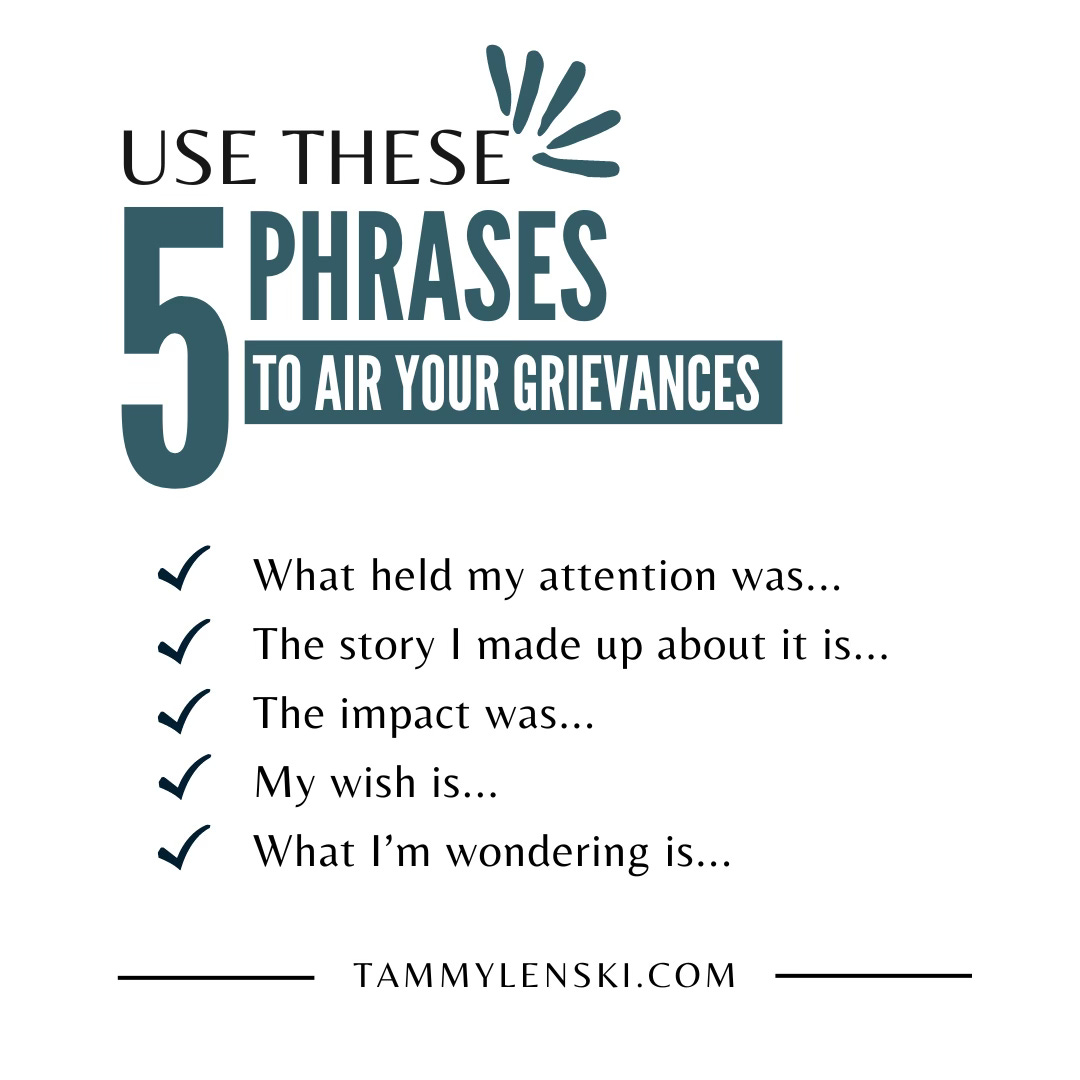Use these 5 phrases to air your grievances and get heard
How to skip the drama and the rumination and raise a concern so they’ll actually listen.
A client owns a small business with a friend. Her friend had begun having problems at home about a year before, and she was distracted and unproductive at work. She took time away from the shop quite frequently. My client had carried the extra weight but was growing weary of many overtime hours, more worry, and a sense that nothing would change. Her concerns had evolved into real grievances about how her friend was taking advantage of her, and she was considering ending the partnership.
I asked about her most recent attempt to raise her concerns. With her permission, I’ll share what she said. Remember, she has a year of frustration under her belt at this point:
It’s not ok for you to dump all the work on me. It’s not ok for you to think that you deserve more time with your family than I deserve with mine. It’s not ok for you to take advantage of me. You’re not pulling your weight, and you’re still taking the same salary as I do. I don’t know how to get your attention about this.
Her business partner’s response? She burst into tears and left the shop for the rest of the day. She was brusque when she came in next, and they hadn’t talked about it since.
My client wanted to know how she might have said it differently and gotten better results. I’m always hesitant to advise precisely how anyone should say something because what sounds natural coming out of my mouth can sound unnatural coming out of theirs. At the same time, I understand that having a sense of how to say it makes it easier to translate ideas into practical use.
In that spirit, here are five useful phrases to help air your grievances in ways that are more likely to be heard and considered.
1. What held my attention was…
This is about your experience of what happened. Don’t try to recount the entire event because that will inevitably lead to digressions about whose memory is more correct. Spotlight what stands out for you — your personal movie trailer of the event or situation. This will help you articulate what’s weighing most on your mind and help you avoid throwing out a long laundry list of complaints that will distract from essential matters.
2. The story I made up about it is…
This is about your interpretation of what happened. The story you’ve told yourself (and possibly others) is not the story of the conflict; it’s your story of the conflict, constructed from fragments that are important to you, your past experiences with this person and others, old wounds, perceived insults, and more. When you use language like “the story I made up,” you reduce their pushback because you’re signaling that you understand there’s more than one way to think about what happened.
3. The impact (on me, my team, my child, etc.) was…
This is about helping them see the impact of their words or actions. We shouldn’t assume the impact will be obvious to them because we don’t all notice and care about the same things. Focus on the impact, not what you believe were their intentions. Conflating intention and impact adds confusion.
4. My wish is…
This is about illuminating your needs. Even once they understand what is bothering you, it may not be obvious to them what you wish would happen instead. Expressing a wish is more effective than expressing criticism when you want someone to change because criticism invites defensiveness and is less persuasive.
5. What I’m wondering is…
This is about bringing them into the conversation in a non-confrontational way. What is it that you want most to understand from them? Using language like “wondering” cues your curiosity and shows them you’re open to their perspective, even if it differs from yours. Be sure not to abuse the idea by using it to cast aspersions (“I’m wondering why you’re such a jerk”).
If I were my client speaking to her business partner and friend, it would sound something like this:
What’s holding my attention is how overwhelmed I am by our partnership and how dumped on I feel. The story I’ve made up in my head about it is that you don’t value our friendship as much as I do. You can imagine that the impact on me is less time with Karl and the kids, less sleep, more stress. I know you can understand that and my wish is that you’ll sit down and have a serious conversation about this with me. I’m wondering why you haven’t wanted to and what could make it possible soon..
A few tips:
Keep it brief. Make it easier for them to track and digest what you’re saying by not overloading them.
Consider time and place. When possible, raise your concerns in private. We inadvertently introduce an element of “performing” when others are nearby.
Leave out the drama. Your words have more power when you seem reasonable.
Ideally, wait until strong emotions aren’t swamping you. You’ll have more access to your good skills when anger or other strong emotions aren’t throwing you off balance.
If you’re afraid you’ll forget the phrases, keep a cheat sheet nearby.



